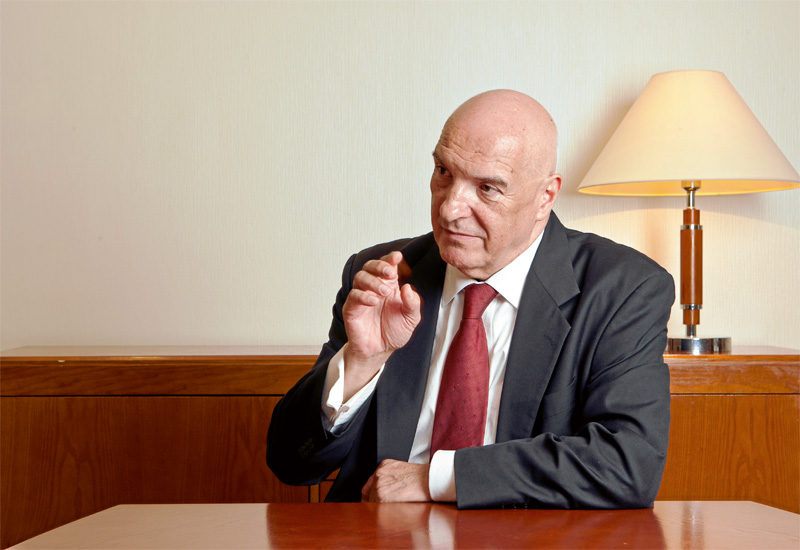 Michel Noblet is overseeing the launch of 20 middle east hotels in the current pipeline, having opened 10 properties within the last 12 months.
Michel Noblet is overseeing the launch of 20 middle east hotels in the current pipeline, having opened 10 properties within the last 12 months.
Hospitality Management Holdings president, CEO and founding partner Michel Noblet looks back on his five decades in the industry and reveals why it is the unpredictability of life as a hotelier that makes him so passionate about the hospitality business
One of the Middle East’s most respected hoteliers, president, CEO and founding partner of Hospitality Management Holdings (HMH), Michel Pierre Jean Noblet was destined for a life in the hospitality industry.
Born in the south west of France soon after World War II, in 1946, Noblet grew up immersed in the business at his parents’ hotel, the 25-room Bordeaux Hotel in Saint Gardens.

| Advertisement |
Instinctively passionate about “entertaining and making people feel good”, Noblet started working in hotels at the end of the school day when he was just 16, motivated by dreams of travelling the world.
He enrolled at Lycee Hotelier Toulouse, where he received “excellent marks”, but was more concerned with satisfying his hunger for the job with hands-on roles.
His goal was to learn every aspect of the industry, to develop his knowledge and challenge himself. Fast forward 50 years, and aged 66, Noblet is celebrating his 50th year as a hotelier. Or, as he prefers to put it, “50 years of vacation”.
To reflect on the past five decades, we met at Coral Boutique Hotel Apartments in Al Barsha Dubai, part of the Coral Hotels & Resorts brand Noblet launched with the help of HE Sheikh Faisal bin Sultan Al Qassimi and HE Sheikh Mohammed bin Faisal Al Qassimi in 2003.
This came following a 30-year career with Le Méridien that saw Noblet open 55 hotels across the world. The Coral brand was the first alcohol-free hotel concept in the Middle East and its success paved the way for three more brands: Corp Executive Hotels, ECOS Hotels and EWA Hotels. There are now 30 operating hotels under the HMH umbrella and 20 in the pipeline, with plans to target Asian expansion.
Noblet’s journey through the industry shows no signs of slowing. Still, he managed to take a pause to sit down with Hotelier and consider the changing shape of the hospitality industry over the past 50 years.
Like many of his peers, as he recalls his early ambition, Noblet acknowledges a distinct shift in the nature of young hoteliers today.
“My aim was to go from one place to another one,” reminisces Noblet, who moved to Paris for his first internship and then London, making historic hotels such as Eiffel Tower, Cafe de la Paix in the French capital and Rubens Hotel on Buckingham Palace Road, his training ground. “The more I travel, the more I want to travel,” he asserts — the reason HE Sheikh Faisal bin Sultan Al Qassimi has nicknamed Noblet “Ibn Battuta”.
But, he acknowledges that this drive comes with a cost, too: “To develop yourself in the most efficient way you have to make some sacrifice — to be far from home,” says Noblet.
“Funnily enough, it was the same for my dear colleagues who have the same position as me today —they were not looking for the money, they were looking for the experience. I was hungry for the job, to learn reception; to learn administration; to learn sales and marketing — if you want to manage, you need to know the job yourself.
How can you give some instruction to an executive chef if you don’t know the job? At least you need to know the basics, you don’t pretend to know better, but you know the basics. At the time that was fundamental,” says Noblet.
“People going into hospitality were enjoying, not counting, their time. It was like a ritual where the motivation was clearly different. People were more hungry for the job. Today a lot of people are there because they have no other option so for them it is only a task.”
The result today is that, while there are more specialists in areas such as sales and marketing, there are less hotel “generalists”.
“To be a generalist takes a lot of time and effort, so today the tendency is a little bit different,” observes Noblet. He believes, therefore, that those likely to be most successful will be those that are most passionate.
“You need to have it in the blood, you have to be born in it. You have to express yourself with a passion, you have to understand that you are in hospitality and that [means] to welcome people and understand the guest experience.”
This is particularly important when it comes to hotel managers, says Noblet.
“A manager has to be popular, believe me when I was general manager I had a lot of friends, a lot of satisfaction, I felt no fear. Because I was so excited, I wanted to position my hotel in the marketplace — I wanted to have fun, I wanted people feeling good, I wanted to be recognised, I wanted to do something for the children, for the families.
A hotel is not just a matter of serving tea and coffee. It is a matter obviously of offering the very best product possible, but at the same time what is important is to instil life — the smile, the uniform, the grooming, the makeup — we are in the show business. The manager is like an artist — he is a magician, he has to make the place very unique so people say ‘we are going to that place so I feel recognised’”, says Noblet.
Article continues on next page ...








 Search our database of more than 2,700 industry companies
Search our database of more than 2,700 industry companies









